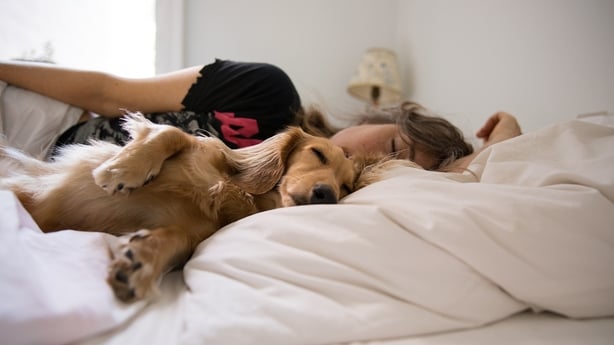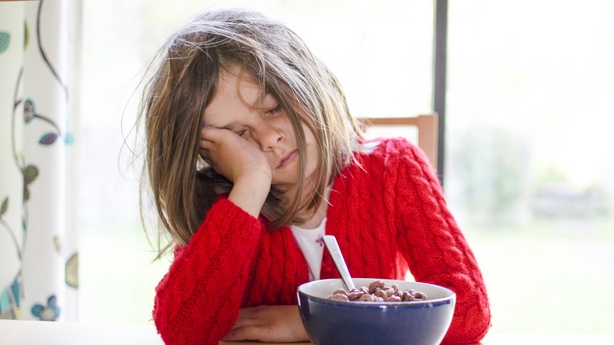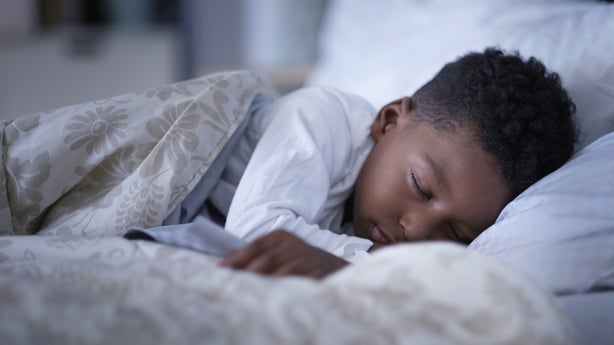Professor Andrew Coogan, a behavioural neuroscientist specialising in sleep spoke to Ciara King about back-to-school sleep habits, weekend lie-ins, naps and sleep disorders. Listen back above.
Getting the kids back into the school-time sleep routine can cause sleepless nights for their parents and care-givers. After a summer of later bedtimes, is there an easy way to make the change? The answer is to do it gradually, according to Professor Andrew Coogan, a behavioural neuroscientist specialising in sleep.
Andrew spoke to Ciara King, sitting in for Ray D'Arcy, about good sleep habits for children, teenagers and adults. Andrew also shares some tips on recognising the difference between the odd sleepless night and a problem that could point to a sleep disorder.

According to studies, we in Ireland are not the worst sleepers in the world, Professor Coogan says; but a lot of us don’t get the best quality of sleep, because we fail to prioritise it:
"Sleep sort of gets pushed to the sidelines a bit."
With a big reset just around the corner, Ciara asks what’s the best way to ease everyone into the back-to-school routine? Andrew says we have no choice about getting up at a fixed time, but we can make it easier for everyone by choosing to go to bed earlier:
"When we go back to school, go back to college, go back to work, what we’re losing control of is when we wake up. What we can control is when we go to bed. So maybe to shift when we go to bed a little earlier. And maybe start now for when the kids go back to school."
Making the change gradually will work better than a sudden shift, Professor Coogan advises. If bedtimes have been more casual during the summer, pull them back little by little so the back-to-school change is not too drastic:
"Don’t try to do it all in one chunk. Do it in sort of 10 minute bite-size segments. Just sort of ease back into it."

The amount of sleep we need as adults is seven to eight hours on average, but this varies with age and with the individual, the sleep expert says. Moving from childhood into the teenage years also marks a change in sleep habits:
"When we move into teenage-hood, the timing of our sleep changes. So we go from being up at seven o’clock in the morning naturally to being up at the crack of noon if you are 16. And that’s not teenagers being lazy or anything; it’s just what their body is doing, it’s part of being an adolescent."
Being a parent can affect your sleep, but Professor Coogan says that doesn’t mean you have a long-term problem:
"If you’ve got a small baby in your house, that’s just having a small baby in your house. I mean, shift workers have a really tough time, and that’s just inherent in shift work. But if there’s not a reason like that, that you can put your finger on, then it might just be a bad cycle you’ve fallen into and there is help available to break that cycle."
Things to look out for are uncontrolled daytime napping and a constant feeling of grogginess or bad temper. These could point towards a problem, Andrew says. If you don’t suffer from these issues long-term, then you don’t need to worry:
"If you’re not feeling excessively tired during the day. If you’re not falling asleep; having a nap when you don’t mean to have a nap in the middle of the day. If you don’t find yourself cranky, short-tempered, difficulty concentrating; then you’re probably OK."

Having the occasional bad nights’ sleep is normal, Professor Coogan says, but if sleep problems persist for more than a month, then you may need professional help:
"If it’s going on, if it’s a repeating thing, then it’s probably time to have a chat, probably with your GP is the best point of contact."
There’s some good news for those who favour the weekend lie-in: Andrew says it’s not necessarily bad for our bodies, we’re just paying back a 'sleep debt’ we’ve racked up during the week.
"Ideally, we’d like the situation where we didn’t have to sleep in on the weekend, but we know that most of us don’t get enough sleep during the working week because we’ve got to get up."
A certain amount of our sleep habits are built-in, as they are determined by our genes, Andrew says:
"We think that 50% of our sleep characteristics are to do with our genes and then 50% are just to do with our circumstances, you know, our lives, our environment"

Even with the genetic component, Professor Coogan says there is a lot we can do to improve our own sleep habits:
"There’s lots we can still do to help us sleep better – It’s not all locked into our genes, so we’re not helpless."
Andrew talks about sleep apnoea, screens in the bedroom and debates the question ‘to nap or not to nap?’ in the full interview listen back above.
For a lively mix of interviews, listener stories and more, head to the Ray D’Arcy show page here.






